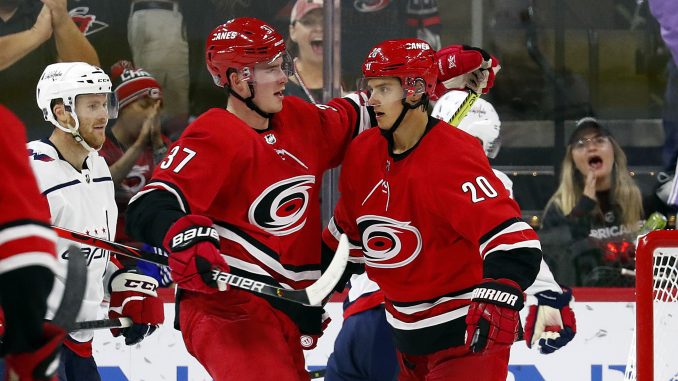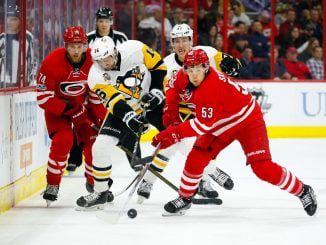
As Rod Brind’Amour is fond of saying, every team enters each NHL season with one goal — to win the Stanley Cup.
So the fact that the Carolina Hurricanes, a year after reaching the Eastern Conference Final, were dispatched in five games by the same Boston Bruins team that eliminated them a year before means the season fell short of its ultimate goal.
Still, the bizarre, one-of-a-kind 2019-20 campaign was a step in the right direction for a franchise that believes it has a bright future.
“There’s no question about that. … We definitely closed the gap there,” Brind’Amour said of his team’s performance this year against the Bruins compared to last season’s series sweep. “We certainly felt different this year than last year playing them. The results are the same at the end of the day.”
The difference from last year to this year is two-fold. The team feels it upgraded its talent, specifically with late-season trades for center Vincent Trocheck and defensemen Brady Skjei, but more importantly continues to see growth from its young core.
So with five days to reflect after the Hurricanes’ season ended, allowing the team’s players, coaches and staff a return to somewhat normalcy with an exit from the NHL’s Toronto bubble, the message was clear: Wholesale changes aren’t needed for Carolina to accomplish its ultimate goal of winning the Stanley Cup.
“We think we’ve made big strides here,” general manager Don Waddell said in the team’s end-of-season press conference held remotely on Monday. “Our younger players have taken another big step this year, and you want to be careful that you don’t get caught up and think you need to make a bunch of changes other than making changes where you always feel like you’re helping your hockey club.”
No “young players” represent the hope of the franchise more than Sebastian Aho and Andrei Svechnikov, the frequent linemates who — at 23 and 20 years old, respectively — are considered the present and future of a team that thinks it has the makings of a longtime contender.
“The talent’s there with those two guys, but what I think excites me — and you’ve heard me say this all the time — is their will to get better,” Brind’Amour said of his two young star forwards. “These guys are not satisfied with where they are individually, and certainly not team-wise. … .. So when you have those two guys, our superstar players and they’re young guys, that’s what makes you excited for where we’re at and where we’re headed.”
The truth is, the Hurricanes are unlikely to make any ground-shaking changes anyway. With the NHL’s salary cap remaining flat the next two seasons due to the financial losses of the coronavirus pandemic, Carolina doesn’t have the space to pursue any high-priced free agents or take on more big-money deals like the Trocheck and Skjei acquisitions.
That said, there is still work that can be done around the edges.
The Hurricanes defense, admired around the league for its skill and depth, will look both different and the same whenever the 2020-21 season begins.
“We think our defense is one of the better defenses in the league, and we want to try to keep the group together as much as we can,” Waddell said.
Five defensemen are signed to contracts worth more than $4 million annually, including Brett Pesce — who missed all of the league’s return recovering from shoulder surgery but Waddell said would “100%” be ready for the upcoming season.
Then there’s former first-round pick Haydn Fleury, a restricted free agent whose increased physicality and willingness to become more involved offensively during “bubble” hockey had him looking more like the player the Hurricanes expected when they selected him seventh overall in 2014.
So unless Waddell can offload one of his defensemen — Jake Gardiner, with three years at an average annual salary just over $4 million, would be the prime candidate but may be difficult to move — it’s hard to see the defense looking much different.
That means the team’s three unrestricted free agent blueliners — Joel Edmundson, Trevor van Riemsdyk and Sami Vatanen — are all likely to move on. Carolina does have two wild cards in prospects Jake Bean and Joey Keane, who were both standouts in the AHL last season and could vie for time.
At forward, Aho and Svechnikov, along with Teuvo Teravainen, make up a top line that should only improve and become one of the best in the league.
The addition of Trocheck gives Brind’Amour a center who can ease the defensive load on captain Jordan Staal while also providing more offense. Rookie Morgan Geekie earned Brind’Amour’s trust and would appear to have the inside track on being the team’s fourth-line pivot.
It’s at the wings where things get a little muddy — and where Carolina could use an upgrade.
Both Nino Niederreiter (11 goals) and Ryan Dzingel (8) had down seasons that hindered the Hurricanes’ secondary scoring. While conventional thinking seems to be that Niederreiter could bounce back after an “unlucky season,” it was Dzingel who was more snake-bit in his first year in Carolina.
Dzingel had a career shooting percentage of nearly 15% entering this year but converted on just 8.2% of his shots this season — a number that would indicate he’s due for a bounce-back year or at least makes him palatable to another team looking for secondary scoring at a reasonable ($3.375M AAV for one year) rate.
Niederreiter, meanwhile, had a dip in shooting percentage (9.6% from 12.1% entering the season) but didn’t suffer as much of a slide as Dzingel.
Then there’s Niederreiter’s shot generation — he managed just 115 shots on goal in 67 games after having 103 in just 36 games last season after he was traded to Carolina. With two years at $5.25 million remaining on his contract, the Hurricanes will likely need Niederreiter to relocate his game in 2020-21.
The good news is a potential star in Martin Necas, who had 16 goals and 20 assists in his first NHL season and looks the type of a player a team can build a power play unit around.
Jordan Martinook and Brock McGinn, who will both be in the final year of their contracts, should be serviceable — if a bit expensive — fourth-line wingers, and Martinook seems unlikely to shoot just 4.5% again and should return to the 10-15 goal range after scoring just twice in the 2019-20 regular season.
With Justin Williams’ return unknown, the Hurricanes will have room to add a winger, and there is a decent market for right wings. Tyler Toffoli, Craig Smith and Jesper Fast could score 15 to 20 goals in a middle-six role.
Then there’s 35-year-old Corey Perry. He isn’t the 50-goal Hart Trophy winner he once was but remains one of hockey’s best agitators — see his antics in Dallas’ Game 2 win over Colorado — and he would bring an edge that’s been missing from the Hurricanes for much of the past decade.
It’s a role Carolina probably hoped Warren Foegele will have grown into over the past couple seasons, but the restricted free agent’s uneven play — he was mostly invisible play in the Boston series — has raised questions about his long-term upside and future with the franchise.
The biggest question remains the goaltending, but the Hurricanes are already bogged down with three one-way deals next year — Petr Mrazek and James Reimer will both be in the final year of their deals, while Alex Nedeljkovic is set to make $737,500 regardless of where he plays — that will cost a total of $7,262,500 against the cap.
Unless the team can unload some cap space, it seems unlikely adding another goalie — particularly one like Robin Lehner — is in the budget.



